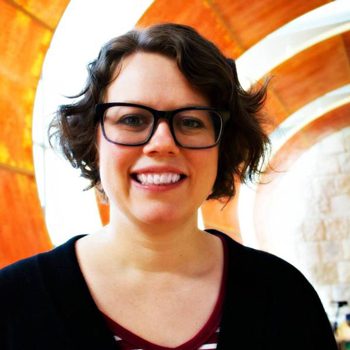Many congregations in the United States are returning to in-person worship, and I have seen robust (and at times contentious) conversations about what comes next. After all, we’ve spent the last year worshipping remotely—but it’s been out of necessity, not choice. Now, as the pandemic is beginning to wane, the impulse in many quarters is just to go back to normal.
But is that even possible at this point?
And what about the discoveries we’ve made using digital media? How should we process the experiences of the Holy Spirit we’ve had while physically distanced? Does it mean we don’t need the building? Is physical proximity necessary?
I mean, heck. Can digital communities ever be church?
These are urgent questions that need careful attention and corporate discernment. And while I would never be presumptuous enough to make any hard-and-fast declarations, as a digital strategist, “geriatric” millennial, and cultivator of several faith-based online spaces, I have some instincts about how we might begin to answer them.
Here are a few thoughts to consider as we discern our way forward.
“To the digital natives I became a digital native, so as to win digital natives”
A touchstone scripture that has shaped how I think about the use of digital technology in ministry is 1 Corinthians 9. Here, Paul is describing the freedom he has to proclaim the gospel.
“For though I am free with respect to all, I have made myself a slave to all, so that I might win more of them. To the Jews I became a Jew, in order to win Jews. To those under the law I became as one under the law…so that I might win those under the law. To those outside the law I became as one outside the law…so that I might win those outside the law. To the weak I became weak, so that I might win the weak. I have become all things to all people, that I might by all means save some” (vv. 19-22).
In this passage, Paul makes it clear that he is willing to be flexible in his approach to ministry, so that he can meet folks where they are and therefore be more persuasive with the gospel message. These days, meeting folks where they are means going online—especially if we want to meet younger generations.
If we insist that digital natives must frequent our spaces in order to “count” as community members, we are not becoming all things to all people, as Paul declares is our right as apostolic ministers. Instead, we are sending the message that we would rather all people become us, so that we don’t have to update our ministry practices.
I’m not sure that’s a faithful response.
I think we are being called to be thoughtful, intentional, and innovative in terms of how we use digital media to reach digital natives (and others) whose interactions take place largely online. A failure to do so is a failure of theological imagination and Christian duty.
What is real community, anyway?
But is an online community a real community? Can it have the same kind of impact and carry the same kind of support as an in-person community?
I grew up a devout Mormon in Utah, and a crucial part of my conversion to Christianity was my participation in online communities. I was never much of an “online” person before I began doubting my Mormon faith, but in the midst of such a major upheaval in my worldview, I turned to the internet for answers. In retrospect, this could have turned out badly, because the internet is full of nonsense—but what better reason to create robust, healthy digital spaces and communities that can be helpful to people in a time of need?
One such community was an LDS and Evangelical discussion blog founded by Tim, a graphic designer from California. He’s not a pastor and his website (which is no longer being updated) wasn’t affiliated with any particular congregation or community. He simply decided to start a free WordPress blog because he was concerned about the lack of robust conversation between Mormons and Evangelicals. I began participating there in the late-aughts, and over the years, I became friends with several other regular participants, both Christian and Mormon. They gave me a place to process my experiences of doubt and faith, and opened up new ways of understanding God.
I’ve also participated in private Facebook groups for Mormon feminists, post-Mormons, and Mormon-women-turned-Christian-pastors (talk about a niche within a niche). In recent years, I’ve participated in groups for everyday disciples, seminarians, and Christian leaders—including Faith+Lead’s own Learning Lab (which you should totally join, if you haven’t yet).
Time and again, I’ve seen these communities perform the same functions that in-person communities perform, sometimes even more effectively. I’ve seen people who have never met in person support community members facing a cancer diagnosis, a divorce, a mental health crisis. I’ve seen members of online communities bless and pray for one another, organize meal trains, raise funds for medical expenses, laugh together, and be present for the deep, personal sharing of pain and trauma.
The idea that digital communities aren’t “real” communities ignores the profound emotional and relational bonds that are formed when people connect in authentic, vulnerable ways. It doesn’t matter if these connections are mediated through digital technology. Digital community is real community, full stop.
So should we just move church online?
Having said all this, there is something important about in-person interaction that I don’t want to minimize. We are more than bits on a screen; we are embodied human beings, and we were made for embodied connection with one another. The truth is, even with the close friendships I’ve formed through digital communities, any time I’ve had a chance to meet online friends in person, I’ve leapt at it.
Sometimes, these communities have organized in-person retreats and camps, and I’ve attended as often as possible. Occasionally, I’ve traveled to meet someone I met online (and vice versa). Once, I even married an online friend (by which I mean I assisted with the ceremony, though I’ve seen romances flourish, too!).
As my friend and professor from Luther Seminary, Kathryn Schifferdecker, taught us in her Old Testament courses: “Matter matters.” The touch of our bodies matters. The sound of our voices matters. Breathing the same air, sharing the same food, taking communion from the same cup (well, when we’re not warding off a deadly plague)—these things matter. In Jesus, God became incarnate, fully enfleshed. No matter how robust digital technology becomes, I don’t believe it will ever replace our need for face-to-face contact with other human beings.
Where does this leave the church?
I can’t say for sure where this leaves us.
Perhaps online Christian communities will become spaces where folks meet, connect, and relate—and then local “cells” will emerge, and folks who were initially acquainted digitally will find ways to get together. Maybe somewhat regional communities will emerge that are largely online, but that plan occasional gatherings for retreats, ceremonies, and shared experiences. Perhaps congregations will start creating worship services designed exclusively for digital delivery, and people will meet in their homes to participate together.
Or maybe something we haven’t even dreamed up yet will emerge, because who can say for sure what the Holy Spirit will do?
These are questions we need to live into now. We need to be open, attentive, willing to experiment, and full of curiosity, so that we don’t get left behind.
Because while I don’t have any sure answers, I can say one thing with certainty: the Spirit is on the move, creating new communities and opportunities, and inviting us to join in.
Let’s not miss out on what God is doing.



